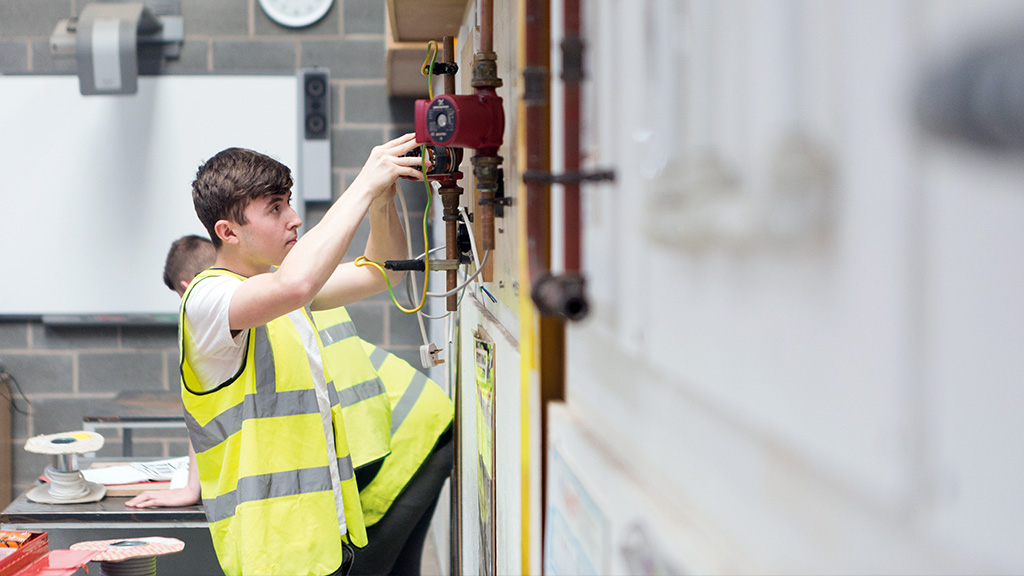Course Overview
Plumbing and Domestic Heating Technicians plan, select, install, service, commission and maintain all aspects of plumbing and heating systems. Plumbing and domestic heating technicians can find themselves working inside or outside a property. Customer service skills and being tidy and respectful are important qualities as they can often find themselves working in customers’ homes as well as on building sites.
As a competent Plumbing and Heating Technician, the installation of plumbing and heating systems includes accurate measuring, marking, cutting, bending and jointing metallic and non-metallic pipework. Appliances and equipment can include gas, oil and solid fuel boilers as well as pumps, heat emitters, bathroom furniture or controls as part of a cold water, hot water, and central heating or above ground drainage and rainwater systems.
Plumbing and Domestic Heating Technicians are at the forefront of installing new and exciting environmental technologies like heat pumps, solar thermal systems, biomass boilers and water recycling systems. It is important for a plumbing and heating technician to be able to work independently or as a team and use their knowledge and skills to ensure that both the system and appliances are appropriately selected and correctly installed, often without any supervision, and done so in a safe, efficient and economical manner to minimise waste.
This will be classroom-based learning, assignment work and practical workshops. You will have two work based portfolios to complete (NVQ Plumbing & Heating and On-site Gas portfolio).
What You Will Study
This advanced apprenticeship standard will develop the knowledge, skills and behaviours required to be a qualified Plumbing and Heating Technician, whilst developing behaviours required by this role.
Knowledge – What is required
- Health and safety – Understand health and safety legislation, codes of practice and safe working practices.
- Core plumbing systems – Understand selection, planning, installation, testing, commissioning and de-commissioning, service, maintenance, fault diagnosis and repair techniques on cold water, hot water, central heating, above ground drainage and rainwater systems.
- Electrical components and control systems - Understand installation and testing techniques for electrical components and control systems on plumbing and domestic heating systems.
Plumbing science and processes – Understand scientific plumbing, domestic heating and mechanical principles. - Principles of environmental technology systems – Understand the principles of domestic mechanical environmental technology systems.
Principles of fossil fuels – Understand the principles of fuel combustion, ventilation and fluing arrangements within a domestic environment. - Customer service – Understand the principles of high-quality customer service and establishing the needs of others (colleagues, customers and other stakeholders). Respect the working environment including customer’s properties.
- Communication – Understand different communication methods, how to communicate in a clear, articulate and appropriate manner and how to adapt communication style to suit different situations.
- Skills – What is required
- Safe working – Operate in a safe working manner by adhering to health and safety legislation, codes of practice and applying safe working practices.
- Core plumbing system techniques – Apply selection, planning, installation, testing, commissioning and de-commissioning, service, maintenance, fault diagnosis and repair techniques on cold water, hot water, central heating, above ground drainage and rainwater systems.
- Electrical components and control systems techniques - Apply installation and testing techniques for electrical components and control systems on plumbing and domestic heating systems.
- Supervisory skills – Take responsibility for own work and safety and welfare of others.
- Oversee and organise the programme of work and work environment Carry out work and manage resources in an environmentally friendly manner.
You then need to choose one option out of the four listed:
Fossil Fuel – Natural Gas
Fossil Fuel – Oil
Fossil Fuel – Solid fuel
Environmental Technologies
- Attendance Expectations
Attendance is one day per week.
- How You Will Be Assessed
Throughout the training period college lecturers/assessors will assess progress in relation to the knowledge element of the standard; a college assessor will work with you in the development and assessment of the competence and behaviour.
In addition, throughout the training period both college lecturers/assessors and your employer representative will complete progress reviews.Whilst there is no formal NVQ diploma required as evidence of achievement, it is the expectation that the delivery will be in line with City and Guilds level 3 qualification.
When both your employer and the college consider you competent in all the knowledge, skills and behaviours you will be entered in for the End Point Assessment.
There is a five-part independent assessment, which includes the following:
- Multiple choice test
- Design project
- Practical Installation test
- Practical application test
- Professional discussion
- Entry Requirements
Typically, it is recommended that apprentices have GCSEs at Grade 9-4 in English and Maths or Functional Skills at Level 2.
Ideally, they will also have ICT and Science qualifications.
- Fee Information
Please contact the Apprenticeship Recruitment Team on 01924 789469 or email
This email address is being protected from spambots. You need JavaScript enabled to view it.
